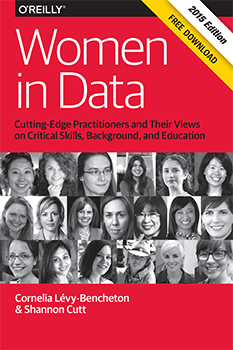Download our updated report, “Women in Data: Cutting-Edge Practitioners and Their Views on Critical Skills, Background, and Education,” by Cornelia Lévy-Bencheton and Shannon Cutt, featuring four new profiles of women across the European Union. Editor’s note: this is an excerpt from the free report.
Dr. Renetta Garrison Tull is a recognized expert in women and minorities in education, and in the STEM gender gap — both within and outside the academic environment. Dr. Tull is also an electrical engineer by training and is passionate about bringing more women into the field.From her vantage point at the University of Maryland Baltimore County (UMBC) as associate vice provost for graduate student development and postdoctoral affairs, Dr. Tull concentrates on opportunities for graduate and postdoctoral professional development. As director of PROMISE: Maryland’s Alliance for Graduate Education and the Professoriate (AGEP) program for the University System of Maryland (USM), Dr. Tull also has a unique perspective on the STEM subjects that students cover prior to attending the university, within academia and as preparation for the workforce beyond graduation.
Dr. Tull has been writing code since the seventh grade. Fascinated by the Internet, she “learned HTML before there were WYSIWYGs,” and remains heavily involved with the online world. “I’ve been politely chided in meetings for pulling out my phones (yes plural), sending texts, and updating our organization’s professional Twitter and Facebook status, while taking care of emails from multiple accounts. I manage several blogs, each for different audiences … friends, colleagues, and students.”
Dr. Tull has been involved with many strategic initiatives, including the following:
- Liaison for institutional collaboration at Universidad Metropolitana in San Juan, Puerto Rico
- Co-PI for the ADVANCE Hispanic Women in STEM Networking Conference
- Co-PI collaborative research on diversity programs with the Quality of Life Technology Center (Carnegie Mellon University/ University of Pittsburgh)
- Leader, “Women in STEM” project for the Latin and Caribbean Consortium of Engineering Institutions (LACCEI).
- Invited speaker for programs at MIT, Cornell, University of Maine System, Society for Hispanic Professional Engineers (SHPE), National Society of Black Engineers (NSBE), American Indian Science and Engineering Society (AISES), The National GEM Consortium, and others
- Former board member of the Northeastern Association of Graduate Schools
- Former vice president of operations for an emerging technologies firm
Dr. Tull believes that women thrive with support and a network. She recommends organizations such as Latinas in Computing; the ACM Richard Tapia Celebration of Diversity in Computing Conference; and the National Science Foundation’s Louis Stokes Alliance for Minority Participation, a grant-based program that provides student scholarships.
Dr. Tull works to increase the psychological sense of community and professional development opportunities for graduate students in Maryland through her involvement with PROMISE, a local program in Maryland that is one of eight National Science Foundation AGEP programs in the United States for underrepresented STEM graduate students and postdocs. Programs include the Summer Success Institute (SSI), Professors-in-Training (PROF-it), Dissertation House, Research Symposium, and others. According to Dr. Tull, these programs have contributed to an increase in applications, enrollments, and graduation rates of underrepresented graduate students in STEM fields in Maryland. Dr. Tull sums up her thoughts about some of the changes and initiatives that need to be implemented across the STEM fields:
Women can be more involved with computing fields, and certainly, opportunities for ubiquitous computing limit restrictions for engagement. However, women need to know that they are invited to the table; they need to see images that show that they are not excluded and they need regular and continuous access to computing environments early, within the K–12 years. Many local, regional, and national groups are doing that. These groups need exposure within the schools, so that girls will take advantage of them. Further, the national media can contribute to a solution by showcasing images of girls working with computers, and women in computing. Some leaders are talking about making computer science a core standard as early as elementary school, in the same way that math and reading are taught at early ages. Building proficiency and acceptance at a young age can go a long way. This acceptance must then continue throughout college, graduate school, and the career.

